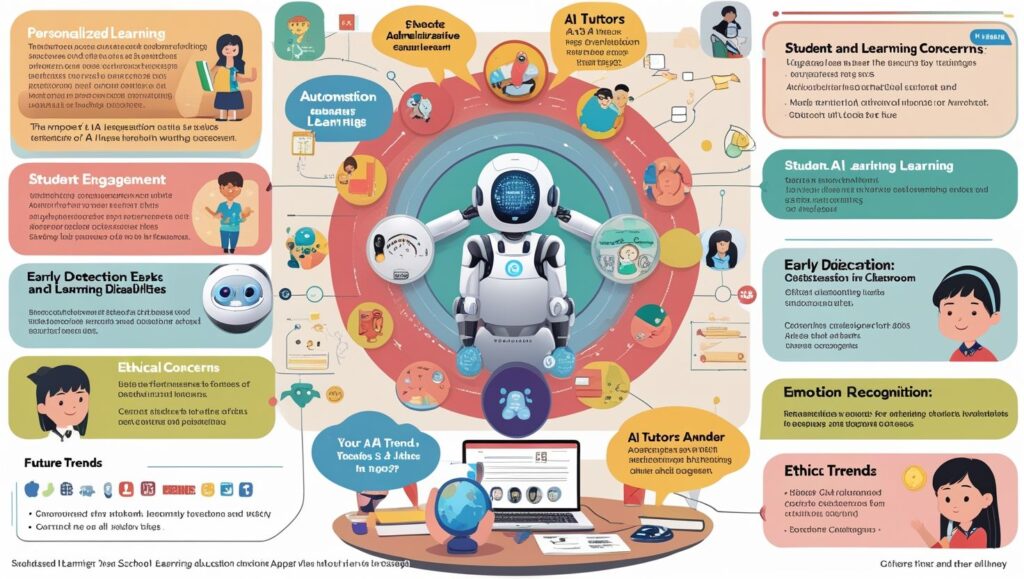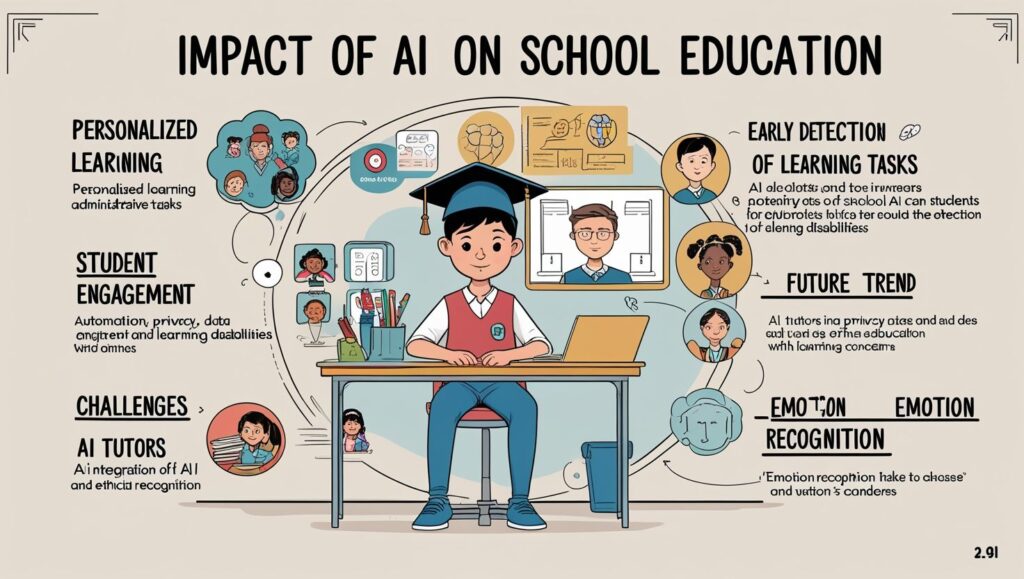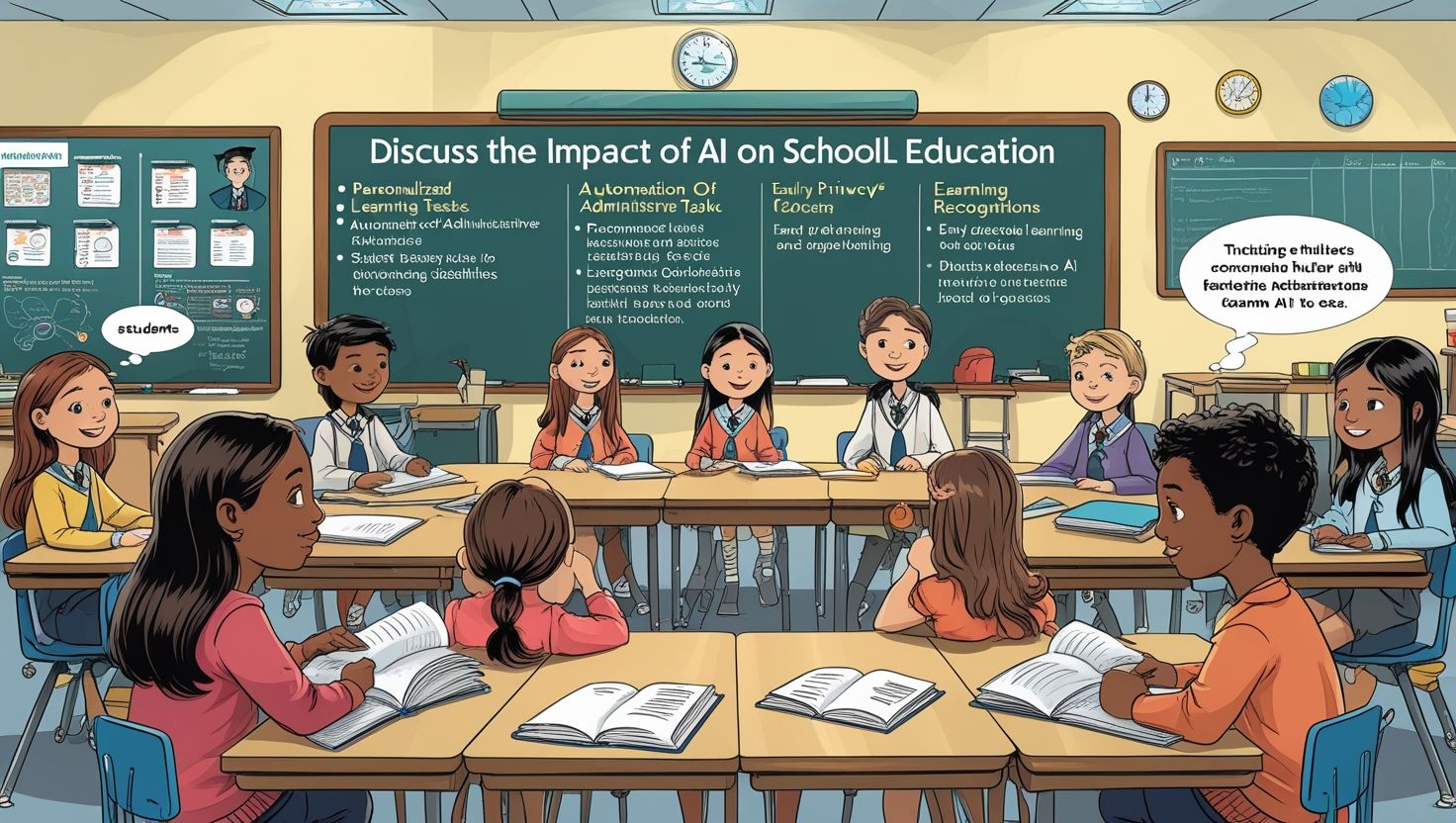Introduction
Impact of AI on School Education, Artificial Intelligence (AI) has emerged as a groundbreaking technology that is revolutionizing many sectors, including the field of education. In the context of school education, AI offers transformative potential by enhancing both teaching and learning experiences. It facilitates personalized learning paths, supports teachers with administrative efficiency, and fosters greater student engagement through smart educational tools. AI applications such as chatbots, adaptive learning software, automated grading systems, and virtual tutors are replacing or supplementing traditional classroom practices.
According to a McKinsey report (2023), the adoption of AI in the education sector is projected to grow at an annual rate of 45%, indicating a robust trend towards technological integration. However, this technological evolution comes with challenges that cannot be overlooked, including concerns related to data privacy, algorithmic fairness, and access equity. In this article, we explore the multidimensional impact of AI on school education by examining its benefits, limitations, and future prospects. The goal is to understand how schools can leverage AI to create more inclusive, efficient, and forward-thinking learning environments.
Personalized Learning Through AI
One of the most powerful applications of AI in school education is the ability to deliver personalized learning. Traditional classrooms often struggle to cater to the individual needs of students due to time and resource limitations. AI bridges this gap by analyzing students’ learning patterns, performance data, and behavioral trends to deliver tailored instructional content. Platforms such as DreamBox Learning and Khan Academy utilize AI algorithms to adapt lesson difficulty based on individual progress, thus enabling students to learn at their own pace and level of understanding (HolonIQ, 2022).
These systems continuously collect data from students’ interactions and adjust lesson plans accordingly, making learning more effective and meaningful. Furthermore, AI-powered learning analytics help teachers identify students who are lagging behind or facing difficulties, allowing timely interventions. Carnegie Learning’s AI-driven math tutor, for instance, can modify question complexity in real time to match a student’s proficiency level (EdTech Magazine, 2021). This approach to adaptive learning promotes inclusivity, boosts confidence, and enhances academic achievement across diverse learner profiles.

Automation of Administrative Tasks
AI significantly reduces the administrative burden on teachers and school staff by automating repetitive and time-consuming tasks. Traditionally, educators spend considerable time on grading, preparing lesson plans, tracking attendance, and managing student records—tasks that take time away from direct instruction. AI-powered tools like Gradescope use machine learning to automatically evaluate student assignments, even for subjects requiring subjective assessment such as essays and open-ended responses (Forbes, 2022).
These tools ensure consistency and objectivity in grading while also speeding up feedback delivery. In addition, AI chatbots such as Ivy.ai are now deployed in educational institutions to respond to student inquiries about admissions, course information, and counseling services, operating around the clock (eSchool News, 2023). AI also supports administrative logistics such as resource scheduling, classroom management, and performance tracking. This automation streamlines school operations, enhances organizational productivity, and allows teachers to dedicate more time and energy to interactive teaching and mentoring, thus improving the overall quality of education delivery.
Enhanced Student Engagement
Engaging students in meaningful learning experiences is one of the core challenges in education, and AI offers innovative solutions to address this issue. Through gamification, virtual simulations, and interactive learning tools, AI turns routine classroom lessons into dynamic and enjoyable activities. Applications like Duolingo and Quizlet incorporate AI-driven gamification techniques to make language learning and concept revision more engaging and fun (TechCrunch, 2022). These platforms adapt question formats and difficulty levels based on the user’s responses, keeping students challenged and motivated.
Additionally, immersive technologies such as Virtual Reality (VR) and Augmented Reality (AR), when integrated with AI, provide hands-on learning experiences. For example, students can explore historical events, biological structures, or physical environments in 3D space, thereby enhancing comprehension and retention. AI-driven assistants like ChatGPT support independent learning by answering queries, explaining concepts, and assisting with homework in real time (The Guardian, 2023). By fostering curiosity and interactivity, AI tools encourage students to take ownership of their learning and remain actively involved in their educational journey.

Early Identification of Learning Disabilities
AI holds immense promise in supporting students with learning disabilities through early detection and personalized interventions. Traditional methods of identifying learning difficulties often rely on periodic assessments and teacher observations, which can delay diagnosis and assistance. AI overcomes this limitation by analyzing vast amounts of behavioral, linguistic, and cognitive data to identify subtle signs of learning challenges. For example, Lexplore uses AI-powered eye-tracking technology to detect reading difficulties like dyslexia by monitoring students’ eye movements during reading exercises (Wired, 2021). This enables educators and specialists to offer early support before the problem escalates.
AI also evaluates patterns in written work, speech, and test performance to uncover potential cognitive or emotional issues. UNESCO (2022) emphasizes that AI-based assessments can provide valuable insights into a student’s mental well-being, attention span, and stress levels. With timely diagnosis, schools can implement tailored instructional strategies and offer special education services that cater to individual needs, thereby promoting a more inclusive and equitable educational environment.
Challenges of AI in Education
While AI presents numerous opportunities in education, it also introduces several complex challenges that must be addressed. One major concern is data privacy. AI systems rely on large datasets, often containing sensitive personal information about students. Without robust data protection measures, there is a risk of unauthorized access, misuse, or breaches of confidential data. Additionally, AI algorithms may inadvertently reinforce biases if trained on skewed or incomplete datasets, leading to unfair treatment of certain student groups (Brookings Institution, 2023). The cost of implementing AI technologies, including infrastructure upgrades, software licenses, and staff training, is another barrier, particularly for underfunded schools.
Furthermore, excessive reliance on AI tools could reduce human interaction in classrooms, potentially impairing the development of social and emotional skills among students. Ethical concerns, such as surveillance and constant monitoring, also need to be considered carefully. The Harvard Education Review (2022) recommends that policymakers establish clear guidelines to ensure transparency, accountability, and fairness in AI applications within educational settings.
Future of AI in School Education
Looking ahead, the integration of AI in school education is expected to become even more sophisticated and widespread. Future developments may include the use of advanced virtual tutors that can emulate human-like interactions, recognizing not only academic needs but also emotional states. Emotion recognition systems powered by AI could identify when students are confused, frustrated, or disengaged, allowing timely support. Blockchain technology may also play a role by enabling secure and tamper-proof educational credentials.
As AI becomes more embedded in school systems, there will be a growing need to equip teachers with AI literacy skills. The Organisation for Economic Co-operation and Development (OECD, 2023) stresses the importance of professional development programs to train educators in using AI tools effectively and ethically. Collaborative efforts among governments, educational institutions, and technology providers are essential to ensure that AI is implemented in ways that support human-centered learning. If guided responsibly, AI can pave the way for a more efficient, equitable, and inclusive educational future.

Conclusion
Artificial Intelligence is reshaping the landscape of school education by offering personalized learning experiences, automating administrative functions, and making education more engaging and inclusive. The deployment of AI tools enables teachers to better understand their students’ needs, provide timely interventions, and enhance overall learning outcomes. However, the adoption of AI also brings forth significant ethical, technical, and financial challenges that must be addressed through careful planning and regulation. Issues such as data privacy, algorithmic bias, and the potential for reduced human interaction require thoughtful consideration.
The future of AI in education looks promising, but it demands a balanced approach that combines technological innovation with human oversight. By investing in AI literacy, infrastructure, and collaborative policymaking, educators and stakeholders can harness AI’s full potential to build resilient and adaptive learning systems. Ultimately, when integrated wisely, AI can support a transformative shift in school education—one that prepares students not just for exams, but for the challenges of a rapidly changing world.
References
McKinsey & Company. (2023). The Future of AI in Education.
- HolonIQ. (2022). Adaptive Learning Market Trends.
- EdTech Magazine. (2021). How AI is Personalizing Education.
- Forbes. (2022). AI in Grading and Administration.
- eSchool News. (2023). Chatbots in Education.
- TechCrunch. (2022). AI and Gamification in Learning.
- Wired. (2021). AI Detecting Learning Disabilities.
- UNESCO. (2022). Ethics of AI in Education.
- Harvard Education Review. (2022). Ethical Considerations in AI Education.
- World Economic Forum. (2023). Future Trends in AI Education.
- OECD. (2023). AI Literacy for Educators.

Your posts always make me think.
You’ve created a space that invites people to think more deeply. That’s a real service in today’s fast-paced digital world.
I have been absent for a while, but now I remember why I used to love this web site. Thanks, I’ll try and check back more often. How frequently you update your website?
https://t.me/s/TgGo1WIN/3
Официальный Telegram канал 1win Casinо. Казинo и ставки от 1вин. Фриспины, актуальное зеркало официального сайта 1 win. Регистрируйся в ван вин, соверши вход в один вин, получай бонус используя промокод и начните играть на реальные деньги.
https://t.me/s/Official_1win_kanal/3371
Greetings from Los angeles! I’m bored to death at work so I decided tto check
oout your website on my iphone during lunch break. I reeally
like the info you ppresent here and can’t wait to take a look when I get home.
I’m amazed at how fast your blog lokaded on my mobile
.. I’m not even using WIFI, just 3G .. Anyways, good blog! https://bookofdead34.wordpress.com